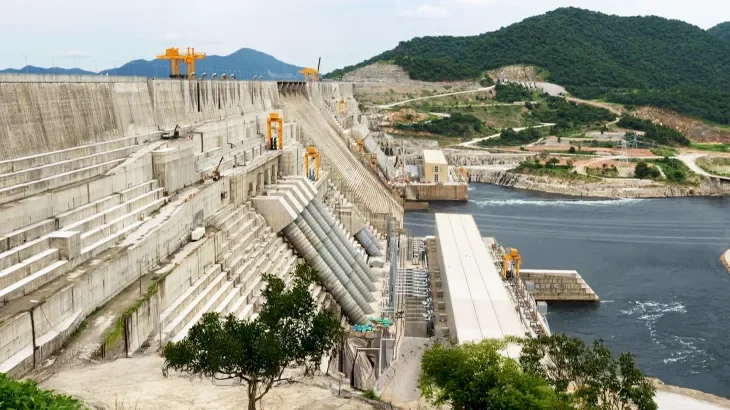
Ethiopia Prepares to Inaugurate "Grand Ethiopian Renaissance Dam" - the Largest Water Project
SadaNews - Ethiopia is preparing today, Tuesday, to inaugurate the Grand Ethiopian Renaissance Dam, the largest hydroelectric power generation project in the country, which aims to generate about 6,000 megawatts of hydropower after 10 years of construction.
Despite the completion of the dam's construction, debate remains between Ethiopia and the downstream countries, Egypt and Sudan, particularly due to the failure of the three countries to reach an agreement on the filling and operation of the dam.
In a statement to Al Jazeera, an advisor to the Ethiopian Minister of Water and Energy said that his country is endeavoring through serious negotiations to calm the concerns of neighboring countries regarding the Grand Renaissance Dam.
The French press agency reports that the massive dam built by Addis Ababa on the Nile has been a major point of contention for over a decade between Egypt, which sees it as an "existential threat," and Ethiopia, which views it as an "opportunity" for the region.
A report by the agency indicates that the "Grand Ethiopian Renaissance Dam," which is a source of pride for Ethiopia, is a rare point of consensus in a country experiencing several armed conflicts, some ongoing, particularly in the Oromia and Amhara regions, which are the second-largest in the country by population. Some conflicts have ended, as in the Tigray region where the war ceased in 2022 after claiming 600,000 lives according to estimates by the African Union.
A Western diplomat working in Addis Ababa told the French agency, requesting anonymity, that "there are only two points of consensus in Ethiopia: access to the sea and the dam," in a country that lost its outlet to the sea with Eritrea's independence in 1993.
The project for the "Grand Ethiopian Renaissance Dam" was launched in April 2011 with a budget of $4 billion. It is the largest hydroelectric project in Africa, with a width of 1.8 kilometers and a height of 145 meters, and a capacity of 74 billion cubic meters of water.
Since its foundation stone was laid, the project has been at the heart of a major regional geopolitical game, facing severe criticism from Egypt, which considers it an existential threat as it could lead to a decline in its water resources.
Egypt, with a population of about 110 million, relies on the Nile to cover 97% of its water needs, particularly for agriculture.
According to the Egyptian Ministry of Water Resources and Irrigation, Egypt's water resources are estimated at about 56.6 billion cubic meters annually, while its water needs are approximately 114 billion cubic meters annually.
Egyptian President Abdel Fattah el-Sisi announced in August that "anyone who thinks that Egypt will overlook threats to its water security is mistaken," affirming, "We will take all measures guaranteed by international law to safeguard our people's existential needs."
Recently, the Egyptian authorities approached the two countries neighboring Ethiopia, Eritrea, which has recently seen strained relations with Addis Ababa, and Somalia.
Sudan has also expressed concern regarding the operation of the Grand Renaissance Dam and emphasized, in a joint position with Egypt in late June, the "rejection of unilateral actions in the Blue Nile basin."
Several mediation attempts among the three countries have been carried out in succession by the United States, the World Bank, Russia, the United Arab Emirates, and the African Union, all of which have failed.
For his part, Prime Minister Abiy Ahmed addressed what he termed as "our neighbors downstream, Egypt and Sudan" last July, stating that "the Grand Renaissance Dam does not pose a threat but a shared opportunity," indicating that "the energy and development that it will generate will not elevate Ethiopia alone."
He reiterated this message yesterday, Monday, in a television interview, saying that "the (Egyptian and Sudanese) dams should be full. We do not want the (Grand Renaissance Dam) to raise any fears" for the two countries.
The French press agency cites experts stating that peaceful coexistence among the countries on the Nile is entirely possible. Abel Abate Demissie, a researcher at the Chatham House group, indicated that "the Nile is sufficient for all countries located above or below the dam if managed correctly."
Source: Al Jazeera + Agencies

Yemen's Human Rights Ministry: We are investigating reports of violations committed by cit...

44 Years After the Massacre.. The People of Hama Publish Photos of Their Relatives Killed...

Continued Flow of African Migrants on the Coasts of Shabwa, Yemen

Curfew in Hasakah and Qamishli in Preparation for Implementing the Damascus and SDF Agreem...

The Head of the American Mission Arrives in Venezuela After Weeks of Maduro's Arrest

Khamenei: Any American Attack on Iran Will Ignite a Regional War

US Judge Refuses to Suspend Immigration Enforcement Operations in Minnesota

